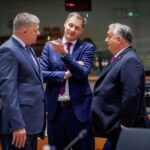Slovak PM cancels military aid to Ukraine
Reading Time: 3 minutesIncoming Slovak Prime Minister Robert Fico did not waste time to state his positions on the war in Ukraine when he spoke to members of the press in Brussels on Thursday, 26 October.
“The conflict in Ukraine is not our affair, and we are not involved in it,” the Slovak politician underlined, on his second day back in power.
Fico this week became Slovakia’s prime minister for the third time, after stints from 2006-10 and 2012-18. His SMER party last month secured the highest percentage of votes, 22.9%, on a socially conservative, pro-Russian ticket.
Slovakia’s liberal, pro-Ukraine President Zuzana Caputova has already refused to support further aid to the war-torn country, saying she must respect the election results.
The stalwart Slovak politician’s words in Brussels underscored his intention to follow through on his “Not a Single Round” election promise. “Our assistance to Ukraine will be limited to humanitarian and civil aid; we will no longer supply weaponry,” he said.
Slovakia in geopolitical spotlight
Regional and global actors will be closely observing Fico’s positions in the shifting landscape in Central European diplomacy and foreign policy.
The return of Fico will mark a significant departure from Slovakia’s previous role as a significant contributor of military aid to Ukraine.
Under the outgoing centre-right government, Slovakia sent several arms packages to Kyiv, including an S-300 air defence system and MiG-29 fighter jets.
Fico’s comment prompted a muted response from Russia. Kremlin spokesman Dmitri Peskov said Slovakia’s contribution to the supply of weapons to Ukraine was not substantial.
After a European Council meeting in Brussels, Fico said EC President Ursula von der Leyen “respects the sovereign right of member states to support or not to support Ukraine militarily and appreciated our attitude towards humanitarian aid.”
In a Facebook post, Fico wrote: “Among other priorities, there is a proposal that EUR 50bn (billions, not millions) of EU money would go to Ukraine by 2027. We have two options – either cut the budget or contribute more from national budgets.”
In a lengthy post Fico opposed any cohesion fund or farming subsidy cuts, and asked for reconstruction projects to include improving Slovak infrastructure in border areas with Ukraine, which he called “one of the most corrupt countries in the world”.
Fico also said he would support EU budget hikes “to increase EU competitiveness and fight illegal migration… Despite Slovak public finances being devastated.”
Coalition deal conditional on pro-NATO stance
Fico’s SMER party will lead a three-party coalition, and several departments, including defence and foreign affairs. According to local media, SMER will also run the ministries of transport, finance, justice, and agriculture.
One of the clauses in the recent coalition agreement among the three political groups was a declaration of Bratislava’s continued pro-EU and pro-NATO stance.
HLAS’s leader Peter Pellegrini has stated that his party, a more moderate faction of SMER, will guarantee the continuity of Slovakia’s foreign policy.
The party, founded in 2020 by dissidents from SMER, which secured 14.7% of the votes last month, will reportedly lead the interior, economy, labour, digitalisation, education, and health departments. Pellegrini will be appointed House speaker and HLAS will also fill the post of deputy prime minister overseeing the EU’s funds and recovery and resilience plan.
Far-right SNS (5.6%) will reportedly lead the environment and culture ministries, and a new sport and tourism ministry to be established next year.
There remain concerns on press freedom – Fico has called journalists “filthy, anti-Slovak prostitutes” and “idiotic hyenas” – rule of law and the Moscow ties of SMER and SMS.
On Thursday, 26 October, the Party of European Socialists (PES) suspended SMER and HLAS for what it called a deviation from the values of the European political family.
“This step has been taken following the clear divergence from the values of the PES family demonstrated by SMER leader Robert Fico. And additionally, as a result of concerns raised following the announcement of a government coalition between SMER, HLAS and a radical-right party,” said the press release.

